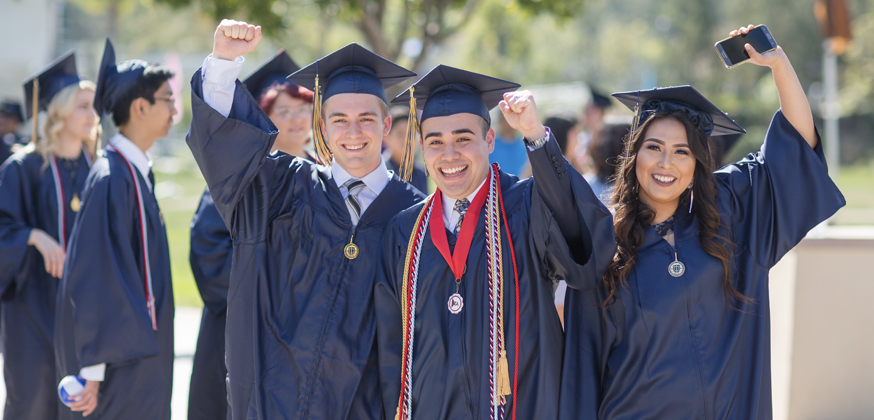
Hispanic Serving Institution
COSTA MESA, California — Vanguard University is a minority-majority institution, with 63% of the students at the school being ethnic minorities. Overall, 45% of the student population is Hispanic.
The school in 2015 received U.S. Department of Education recognition as a Hispanic Serving Institution (HSI), with at least 25 percent Hispanic full-time equivalent undergraduate enrollment. It is the only Pentecostal school in the nation to be an HSI.
Since then, Vanguard has received over $9 million in competitively awarded U.S. Department of Education grants for Hispanic education, although all students benefit.
These grants have supported students by providing academic and career resources; faculty development; Science, Technology, Engineering, and Math (STEM) programming and laboratory equipment; and teacher preparation programs.
“I’m pleased, but not surprised, at the rapidity in the increase in the number of Hispanic students at Vanguard,” says Vanguard President Michael J. Beals, 63.
Tommy Casarez, Division of Theology associate dean, says the shift began in 2000 with the establishment on campus of the Center for Urban Studies & Ethnic Leadership — which later became the Jesse Miranda Center for Hispanic Leadership. Before his death in 2019, the Hispanic Pentecostal pioneer served as a bridge builder among various ethnic, generational, denominational, and political entities. He was a 1966 Vanguard alumnus.
“Jesse Miranda was a legacy leader,” says Casarez, 51. “Opening the center put a stake in the ground signaling the school’s intention.”
RETAINING STUDENTS
The university continued its commitment to Hispanics in February 2021, with the appointment of Norlan Hernández as the first full-time director of the center. Casarez notes that Vanguard had just 20 Hispanics in the entire school when he graduated in 1994.
“If the last five years are any indication, Hispanic Serving Institution trends will continue to rise,” says Casarez, a former president of the AG’s LABI College in La Puente. “We have to be ready.”
Many current Vanguard students are the first in their family to seek higher education.
“It’s important to retain these students so they don’t fall through the cracks and drop out,” says Hernández, 32. Vanguard has achieved parity in graduation rates of Hispanics compared to white students.
“We don’t want to be just a Hispanic-enrolling institution,” Beals says. “We want to be a Hispanic-graduating institution.”
Hernández believes the Miranda Center not only makes Hispanic students feel welcome, it also is a means to strengthen Latino ties with AG districts and community nonprofits. And it is a way the school can start relationships with organizations it hasn’t connected with before. For instance, the center this month is hosting a homelessness and mental health summit.
“We are actively looking for ways to be present in the community,” Hernández says.
Jon Allbaugh, Vanguard dean of missional alignment and effectiveness, agrees that it makes sense for the university to focus on ethnic minorities.
“Geographically, Los Angeles is the melting pot of the nation,” says Allbaugh, 55. “The Pentecostal numbers are growing among Hispanics. We have a great opportunity right in front of us.”
Theology Department Chair John Mark Robeck, 47, says Hispanic emphasis is more than a classroom experience.
Students have the opportunity to serve internships at a variety of churches and parachurch organizations, ranging from Templo Calvario, an AG Southern Pacific District megachurch in Santa Ana, to Enlace, an Irvine-based organization that equips congregations in Latin America.
The curriculum has been reshaped to affirm and nurture Hispanic students who may sense a ministry calling. Robeck, who is fluent in Spanish, points out that Vanguard’s curriculum now includes courses on Latin America theology, post-colonial theology, and race and religion in America. Robeck, a former AG world missionary in El Salvador, leads student study teams back to the country for entrepreneurial community transformation projects. Robeck, a 1998 Vanguard alumnus, joined the faculty in 2017.
The recent upsurge in Hispanic enrollment means there is a higher ratio of Hispanic students versus Hispanic faculty. But Beals says when a faculty vacancy arises, the hiring process will reflect a qualified pool of candidates that includes Hispanics.
“Diversity is not the leading issue in hiring, but we open the door for candidates across a broad spectrum of indicators,” Beals says.
Theology majors have opportunities to intern at a plethora of Hispanic congregations in the area, both from the SoCal Network and Southern Pacific District.
CALLED TO VANGUARD
Ezequiel Talavera, a junior from Lawndale, California, is an outreach chaplain on campus, often overseeing chapel services. His Guatemalan-Mexican parents, Frank and Mabel Talavera, are pastors at Mission Ebenezer Family Church, a Hispanic megachurch in Carson.
But after high school, Ezequiel spent a couple of years apart from God, “deep into sin and shame.” Although he long had sensed a ministry calling, Talavera instead wallowed in frequent drug use, content to work in a fast-food restaurant. His sister, Melinda, a Vanguard graduate, invited him to a young adults ministry retreat. There, he says, the Lord told him to attend Vanguard.
Talavera says he received a word from the Lord through his sister: God says the prayers of your mother and grandmother are no longer working for you; it’s time for you to do something for Me. Another retreat attendee then told him the Lord would use him to reach youth. Talavera, 21 at the time, recommitted his life to the Lord that night. Yet obstacles remained.
“I didn’t do so great in high school; I barely graduated,” says the good-natured Talavera. “I didn’t get my financial aid because of my age and grades.”
Nevertheless, he gained admission, and his grades improved. Professors encouraged him.
“Vanguard is very good at building up those who have been called into ministry,” Talavera says.









Leave a Reply